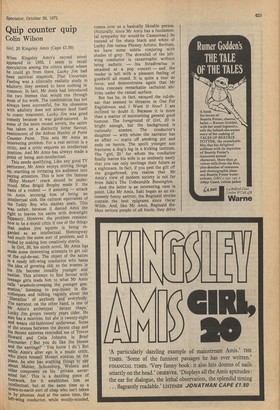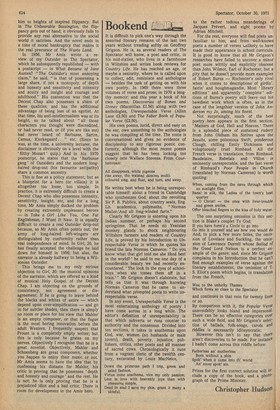Quip counter quip
Colin Wilson
Girl, 20 Kingsley Amis (Cape £1.50) When Kingsley Amis's second novel appeared in 1955, I seem to recall Speculation among the critics about where he could go from there. Lucky Jim had been satirical slapstick; That Uncertain Feeling was a clinically realistic study in adultery; they seemed to have nothing in Common. In fact, Mr Amis had introduced the two themes that would run through most of his work. The combination has not always been successful, for his obsession With adultery does not always lend itself to comic treatment. Lucky Jim was good comedy because it was good-natured. In some of the more recent novels, the satire has taken on a distinctly bitter flavour, reminiscent of the Aldous Huxley of Point Counter Point. This sets Mr Amis an Interesting problem. For a real satirist is a critic, and a critic requires an intellectual Position. And Mr Amis has always made a Point of being anti-intellectual.
This needs qualifying. Like any good TV Performer, Mr Amis enjoys stirring things tiP, startling or irritating his audience into Paying attention. This is how the famous
'filthy Mozart' crack should be ,understood. Miss Brigid Brophy made it the
basis of a violent — if amusing — attack on Amis, accusiqg him of being an intellectual slob, the cultural equivalent of the Teddy Boy who slashes seats. This was unfair, because it denied Amis the right to leaven his satire with downright flippancy. However, the problem remains: how to be a moral critic it one of the things that makes you squirm is being regarded as an intellectual. Hemingway had much the same sort of problem; and it ended by making him creatively sterile.
In Girl, 20, his ninth novel, Mr Amis has Made some interesting attempts to get out 9f the cul-de-sac. The object of the satire is a randy left-wing conductor who hates the idea of growing old; so the women in his life become steadily younger and ' nastier. This attempt to find favour with teenage girls leads him to what Mr Amis calls ' arsehole-creeping the younger generation,' listening to pop-music in disCotheques and talking vaguely about the liberation' of anybody and everybody. The narrator, on the other hand, is one of Mr Amis's archetypal 'decent chaps,' Lucky Jim grown twenty years older. He also has a mistress, but she is twenty-eight and wears old-fashioned underwear. Some of the scenes between the decent chap and his decent mistress reminded me of Trevor Howard and Celia Johnson in Brief Encounter. (' But you do like the blouse and the earrings?' 'You know I do.') But While Amis's alter ego is a music critic, Who plays himself Mozart sonatas on the Piano, he also has scathing things to say about Mahler, Schoenberg, Webern and Other composers on his 'private nevernund list.' This is a dazzling piece of !ootwork, for it establishes him as intellectual, but at the same time as a .down-to-earth sort of chap who isn't taken in by phonies. And at the same time, the left-wing conductor, while woolly-minded,
comes over as a basically likeable person. (Naturally, since Mr Amis has a fundamental sympathy for would-be Casanovas.) So instead of the sharp black and white of Lucky Jim versus Phoney Artistic Bertram, we have some subtle conjuring with shades of grey. The downfall of the leftwing conductor is catastrophic without being sadistic — his Stradivarius is smashed at a pop concert — and the reader is left with a pleasant feeling of goodwill all round. It is quite a tour de force, and demonstrates again that Mr Amis conceals remarkable technical abilities under the casual surface.
But has he, in fact, escaped the cul-desac that seemed to threaten in One Fat Englishman and I Want It Now? I am inclined to doubt it. Because it is more than a matter of maintaining general good humour. The foreground of Girl, 20 is bright enough, but the background is curiously sombre. The conductor's daughter — with whom the narrator has an affair — starts off smoking pot and ends on heroin. The spoilt younger son fractures a dog's leg in a kicking tantrum. The 'girl, 20' for whom the conductor finally leaves his wife is so sexlessly nasty that you can only envisage their future as a nightmare. In fact, if you peel the gilt off the gingerbread, you realise that Mr Amis's view of modern society is not far from Saki's The Unbearabte Bassington.
And the latter is an interesting case in point. Like Mr Amis, Saki began as an extremely funny satirist; the Reginald stories contain the best epigrams since Oscar Wilde. And, like Mr Amis, Reginald dislikes serious people of all kinds; they drive him to heights of inspired flippancy. But In The Unbearable Bassington, the flippancy gets out of hand; it obviously fails to provide any real alternative to the social world it satirises. And the novel ends in a tone of moral bankruptcy that makes it the real precursor of The Waste Land.
In 1956, Mr Amis wrote a review of my Outsider in The Spectator, which he subsequently republished — with a postscript — in What Became of Jane Austen? "The Outsider's most annoying claim," he said, "is that of possessing a large share, if not a monopoly, of depth and honesty and sensitivity and intensity and acuity and insight and courage and adulthood." His contention was that the Decent Chap also possesses a share of these qualities, and has the additional advantage of being less of an egotist. At that time, his anti-intellectualism was at its height, so he talked about "all those characters you thought were discredited, or had never read, or (if you are like me) had never heard of: Barbusse, Sartre, Camus, Kierkegaard " etc. (Since he was, at the time, a university lecturer, the disclaimer is obviously on a level with the 'filthy Mozart' quip.) And in his 1970 postscript, he states that the ' Barbusse gang' of Outsiders and the modern longhaired drop-out (his favourite antipathy) share a common ancestry.
This is fine as a policy statement; but as a blueprint for a hero (or villain) it is altogether too loose, too simple. In practice, it is extremely difficult to create a Decent Chap who also possesses intensity, sensitivity, insight, etc, and for a long time, Mr Amis simply ducked the problem by creating extremely unpleasant heroes — in Take a Girl Like You, One Fat Englishman, I Want It Now. It is equally difficult to create a real Outsider drop-out because, as Mr Amis often points out, the army of long-haired left-wingers are distinguished by conformity rather than real independence of mind. In Girl, 20, he has finally accepted the challenge he laid down for himself in 1956; but alas, the narrator is already halfway to being a Wilsonian Outsider.
This brings me to my only serious objection to Girl, 20: the musical opinions of the narrator, which are offered as a kind of musical Holy Gospel of the Decent Chap. I am objecting on the grounds of consistency, not agreement or disagreement. If he is going to leave behind the blacks and whites of satire — which depend upon over-simplification — and go in for subtler shades, then there is simply no room or place for his view that Mahler is an empty composer, or that the fugue is the most boring innovation before the adult Western. I frequently suspect that Proust is a completely empty writer; but this is only because he grates on my nerves. Objectively I recognise that he is a great novelist. Objectively, Mahler and Schoenberg are great composers, whether you happen to enjoy their music or not. Mr Amis seems to have the idea that by confessing his distaste for Mahler, his critic is proving that he possesses 'depth and honesty and courage' and the rest. He is not; he is only proving that he is a prejudiced idiot and a bad critic. There is room for development in the Amis hero.



































 Previous page
Previous page